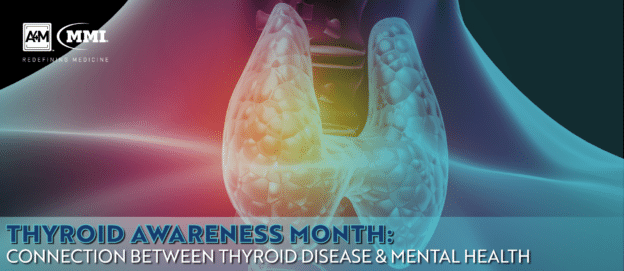Thyroid conditions can affect people of all ages, however, they affect women significantly more often than men. Symptoms of hyperthyroidism include restlessness, inability to focus, anxiety, weight loss, and tachycardia: all of which can be alleviated with appropriate treatment methods. However, emerging research reveals a connection between thyroid disease and the development of mental health conditions – which are not easily mitigated with treatment of thyroid dysfunction.
Mental Health Disorders and Hyperthyroidism
As part of the new research published in Pediatrics, researchers investigated the prevalence of attention-deficit/hyperactivity disorder (ADHD), adjustment disorder, anxiety, bipolar disorder, depression, and suicidality in pediatric patients with diagnosed hyperthyroidism. Using the Military Health System Data Repository, researchers identified children between the ages of 10 and 18 who had been diagnosed with hyperthyroidism and at least one of these mental health conditions during the study period (2008-2016).
Led by Dr. Melissa Buryk, the team of Naval Medical Center researchers analyzed data from 1,894 females and 585 males determine prevalence ratios of the mental health conditions. They found that compared with children without hyperthyroidism, the prevalence ratio of comorbid mental illnesses ranged from 1.7 for ADHD to 4.9 for bipolar disorder in children with hyperthyroidism. All risk increases were statistically significant. Authors noted that in over 40% of patients, mental health conditions were diagnosed prior to thyroid disease by at least 90 days, with ADHD diagnosed before hyperthyroidism in nearly 70% of cases.
Most notably, the research team found the prevalence of suicidality in patients diagnosed with hyperthyroidism to be five times higher than in those without the disorder, marking an important risk factor that requires increased physician attention.
Recommendations
According to Dr. Buryk and her colleagues, it is important for physicians to consider thyroid disease as a possible underlying cause of the presented symptoms of a mental health condition. They also note that mental health conditions diagnosed in children with hyperthyroidism are not only a result of elevated thyroid levels. As their findings suggest, mental illness persists despite thyroid treatment, underscoring the need for healthcare providers to continue addressing mental health symptoms even after thyroid levels have returned to proper levels.
Authors acknowledged the limitations of their study, which included a transient population, the absence of demographic information, the relatively limited amount of data, and the inability to verify diagnoses due to study design.
To date, there has been limited information regarding the association between thyroid disorders and mental health conditions; the mechanisms underlying the connections are still unknown, however, some studies point to a greater incidence found in autoimmune hyperthyroidism patients. As the first study to reveal a strong connection between mental health conditions and hyperthyroidism in pediatric patients in a large sample size, the latest research reveals consistent results with adult literature. Further clinical research is needed to ascertain the prevalence of mental illness among the pediatric population suffering from hyperthyroidism as well as the prevalence ratios in adult patients.
Currently, the American Thyroid Association guidelines do not address mental health conditions or the evident increased risk of suicidality in pediatric patients. These findings emphasize the need for the inclusion of this criteria and for additional investigations to improve current understanding of risk factors, pathophysiology, and effective treatment methods for thyroid disease.




